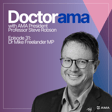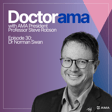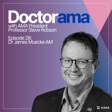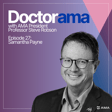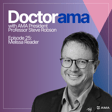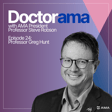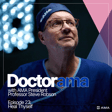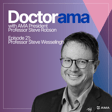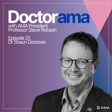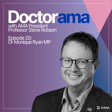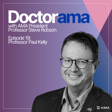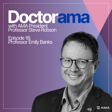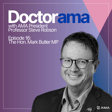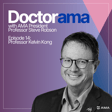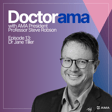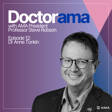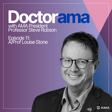Become a Creator today!Start creating today - Share your story with the world!
Start for free
00:00:00
00:00:01

Episode 17 - Natasha Robinson
In episode 16 of Doctorama AMA President Professor Steve Robson chats with Natasha Robinson.
Recommended
Transcript
Introduction to Dr Rama Podcast
00:00:01
Speaker
Well, there's nothing that generates clicks and shares like a good health story. And the pandemic has shown us just how important health stories are to Australians. But if you ever thought about the people writing the stories, what's important to them and how do they go about it? Well, we're all interested in health stories and we're going to learn all about it today on Dr Rama.
00:00:24
Speaker
You're listening to Dr Rama with Steve Robson, bringing you the best of health, medicine and people.
Natasha Robinson's Journey to Journalism
00:00:32
Speaker
Well, I'm pleased to say my guest today on Dr Rama is the health editor for the Australian newspaper, Natasha Robinson. Natasha, welcome to Dr Rama. Hi, Steve. Thanks for having me. It's a real pleasure. I think many, many people will have read your journalism and your work over many years. You know, one of the key faces in health journalism in Australia.
00:00:53
Speaker
But a lot of people will not recognise how you got into the role that you got into. And a lot of people probably don't recognise that you had a very different start to journalism. And if I'm not mistaken, you began in the arts somewhere else in the world. Do you want to tell us a little bit about that? That was a question I was not expecting. Yeah, look, I was one of these one of these people that
00:01:18
Speaker
didn't really know quite what I wanted to do when I left school like many young people. I did go to university but I just wasn't ready for it so I just did, you know, range of
00:01:31
Speaker
different jobs, saved up my money and just took myself off on a plane and, you know, kind of travelled the world and landed in London like many young Australians. And when I was over there, I spent a few years in London and I decided since I was in the mecca of theatre and, you know, loved it, I kind of was, you know, really into it, you know, out there kind of, you know,
00:02:01
Speaker
couple of times a week getting the £10 last minute tickets that were always available and seeing some incredible theatre. And so I decided to study theatre over there, which I did. It was a kind of really old school
00:02:16
Speaker
drama course that was set up like the old repertory theatre training in the old days in England. It was a classical theatre degree, so we did Shakespeare and French restoration comedy and
00:02:37
Speaker
Russian theatre check off mostly. And yeah, that's what I did over there. And when I got back to Australia, I decided, you know, it looked like it was never a serious plan to be an actor. And I didn't really want to do that. So I went to uni finally when I was about 23 and studied journalism. So Natasha, how long were you in the UK for doing the theatre work?
00:03:07
Speaker
I was there for about three years and I did that course. It was a one year, one year long course. So it must have been a wrench coming back to Australia after an experience like that. No, look, I was very ready to come home by the time that I did. I was ready to, I think,
00:03:31
Speaker
you know, go to uni. I really, really, really wanted to go to university. I really wanted to be a journalist and, you know, I had journalism in my family, family members who were journalists. And yeah, no, by the time I did it, I was very much ready for it and really just hit the ground running and didn't look back.
00:03:55
Speaker
So theatre is about telling a story and holding the attention of an audience.
Theatre Background Enhancing Journalism Skills
00:04:01
Speaker
Is that something that you like to do in journalism as well? Yeah, look, I do think that training has stood me in quite good stead.
00:04:13
Speaker
for journalism, especially as it's changed. If you're in newspapers, you're not just a print journalist anymore. We're in the broadcast business very much so these days. And of course, I had some time in broadcast journalism as well at the ABC.
00:04:34
Speaker
Having that training, that real background in improvisation and being comfortable in front of an audience, in front of a camera was definitely useful. I think there's some translation to telling stories, but also the love of language as well. That's a big part of both of those.
00:04:59
Speaker
things, theatre, plays, and journalism. I think that I always loved newspapers for that reason because I do love language, I love to tell stories, I love to write, and it's always what I loved my whole life.
00:05:21
Speaker
I think, yeah, that's why I probably gravitated back to newspapers as well, because I feel it's the medium where you can tell stories in the most depth with the most creativity. And, you know, look, I think there was a time there where, you know, we didn't even know if newspapers were going to survive, but they really have stood the test of time because people
00:05:48
Speaker
love reading stories and they love long-form journalism. People still love, whether it's on their iPad or, you know, a lot of people still actually buy physical papers on the weekend. So I think it's wonderful to see that newspapers have been able to come through that time where we didn't even know how they were going to be viable. And now with digital subscriptions and all of those things and all of the innovations, I think they're in
00:06:18
Speaker
Pretty pretty good health Natasha this I think personally there's nothing better than a weekend spreading out a newspaper with a you know a good coffee and and just reading something in depth and I Understand why the circulation of weekend newspapers is so great because it's such a pleasurable thing to do
00:06:36
Speaker
Now, you've worked in national affairs, in journalism, in national affairs, crime, education, a lot of different rounds. Is being a journalist a journalist? Is it the same skills in each thing, or do they all have differences that you need to learn and to, I guess, master to get the story across in a newspaper? Yeah, I think there's a lot of similarities, but there are some differences as well.
00:07:06
Speaker
When I started, it was still very much the days where you'd start as a cadet on general news.
00:07:17
Speaker
get thrown in to covering really everything. And then in those days, a lot of us would do a stench on courts, and I did that, which was really excellent training, not just in
00:07:36
Speaker
accuracy and being au fait with all of the legal protocols and risks and legal issues that you need to be so aware of.
00:07:54
Speaker
as a journalist, but it very much, you know, it was incredibly, incredibly interesting as well, but you had to, it was very, very good training for junior reporters, which I'd always recommend because you, you know, if you weren't right, you know, if you got something wrong and you're covering a trial or you reported something the jury didn't hear or you,
00:08:22
Speaker
you got something radically wrong, you were accountable. It wasn't unusual to see journalists ask to stand up in the back of the courtroom and explain themselves to judges. I think that is very, very good training for any young journalist. I did that for a couple of years in Melbourne and it was a gangland era at that time.
00:08:51
Speaker
absolutely incredibly interesting and dramatic. But there were always good court stories in Melbourne. I don't know why. They were all just the best court stories always came out of Melbourne.
00:09:07
Speaker
Um, so I covered some incredible trials and, um, you know, there was the time of, um, the kind of first huge terrorism, uh, court cases, uh, as well post 9 11. And, um, yeah, that was a, that was a really, really wonderful time. And I did.
00:09:26
Speaker
do quite a bit of investigative work when I was there as well, which was kind of possible because I worked for the Australian and we're in a bureau and you just have a bit more time and space. And so there were some really kind of very, very interesting investigative
00:09:50
Speaker
sort of issues I was able to sink my teeth into, particularly around war crimes investigations, which ended up resulting in a very significant prosecution, which is kind of, yeah, was an incredible experience to have as a young reporter. Yeah, look, we're going to come, I'm going to come
00:10:13
Speaker
in due course to the influence that you can have as a journalist and breaking stories and delving into things. But just first, I mean, what are the elements that make a good story? When you're looking for a story, what are the elements that you look for that you say, look, this is going to be a good story?
Crafting Compelling Stories
00:10:32
Speaker
Yeah, well, I guess when you're a journalist, the first criteria is that needs to be new, needs to be something that's
00:10:40
Speaker
that people haven't heard before, they don't know that you're revealing or if it is a kind of known issue, just a new aspect to that issue or a new angle. I don't think that you necessarily, I mean, look, you wouldn't want to rule out all stories on that basis, on the other hand, because
00:11:06
Speaker
Sometimes there are some issues that you may not think in you or you might think, you know, been well known. But if you, if you, you know, if they're significantly in the public interest and a lot of people are interested in them, if you can approach them in a new and interesting way, that's also, you know, can be an incredibly successful
00:11:32
Speaker
strategy as well and yeah so I guess newness you know some kind of I mean look like it has to be has to catch your attention right like no one really is going to read a story that
00:11:49
Speaker
It's just boring. I don't know how you judge that, but it's just a radar. It's just a sense that you have. It's hard to put a finger on that sort of new sense. But Tash, I would have thought that these days you actually have a lot of metrics to help you. I mean, it strikes me that
00:12:12
Speaker
news outlets have a lot of data about what stories are shared, what stories are clicked and read and things like that. Do those metrics help you, I guess, hone that radar about good stories? Do you pay a lot of attention to them? Yes, we have to. The newsroom absolutely does.
00:12:34
Speaker
I don't think we're slavish to them at the Australian, because there's still very much a sense that they're very, very important, but that we're in the business of telling stories that are in the public interest to tell. And so we would never sort of say, well, we don't think this story is going to get a lot of clicks, therefore we're not writing it. That's not the approach that we take.
00:13:02
Speaker
But yes, they have been very, very useful in identifying what people are engaging with. Sometimes it's not at all what you would expect.
00:13:18
Speaker
I know you'd like to talk about my recent magazine piece on urinary tract infection, but I think when I... I'm just going to say that that's an example, which you'll explain later, but that is an example of when I'm working on a magazine piece about this.
00:13:40
Speaker
my chief of staff is going, oh, well, that's worthy. But the engagement was incredible. And so I think it's not always what you'd expect. And it definitely does tell us a lot about what's actually going on for people in their lives. My recent reporting on
00:14:08
Speaker
anti-depressant over prescription and people struggling to get off antidepressants.
00:14:13
Speaker
massively, massively popular story. And it just tells you this is a real issue in the community. I mean, we know that with one in seven people on antidepressants, but it just goes to show it's a deeper level of insight as to the struggles that people are having, what they're actually wanting to read about to actually get some sort of insight and help and information.
00:14:41
Speaker
Now look, you alluded to a story that I want to bring up now, and you and I have spoken about this quite a bit. I'm very interested as a gynecologist in this, but about chronic urinary infection, and you had a long-form magazine piece fairly recently, and I think the engagement with that was deep across the community, a lot of interest.
00:15:04
Speaker
But I'd really like to understand how you came to embrace the issue, what your approach is when you're writing a long-form story like this that talks about people who are going against the norm. How you approach something like it, because I presume the stakes are pretty high if you're talking about something that's not so orthodox.
Impactful Reporting on Health Issues
00:15:23
Speaker
Yeah, well, I just became aware that there were many, many, many women in particular and some men
00:15:34
Speaker
and some children who were suffering with urinary tract infections for what was an absolutely unbelievably inordinate period of time, sometimes decades. They were just not receiving viable treatment and they would go to doctors, they'd go to urologists and they were in enormous amounts of distress.
00:16:02
Speaker
the fact they were getting no help. And even that they were being told often that, well, you don't have a positive result on your urine test, you don't have an infection at all. Despite the fact that they had an incredible suite of raging symptoms that were
00:16:24
Speaker
debilitating. I just thought, how can this be? This is an infection in the age of antibiotics. How can it be that there are these thousands and thousands of people who are quite literally disabled, unable to leave the house for even 10 minutes at a time?
00:16:46
Speaker
because they're constantly having to go to the toilet because they're in so much pain and we're not able to actually give them any
00:17:00
Speaker
any treatment whatsoever. They're just coming away in one case with one woman that I interviewed being told, well, look, there's nothing that I can do for you. She's 28 years old. The only thing I can do for you, she was told by a urologist, is remove your bladder.
00:17:20
Speaker
And this was just an unbelievable to me. So, you know, when I started to research the matter and look into it, you know, it was very obvious that medicine had completely failed these women. And, you know, the diagnostics were failing, highly inaccurate. The treatment was
00:17:47
Speaker
was just failing or not being offered at all. It looks a very complex, difficult to treat condition. There's no doubt about it. But the idea that people have
00:18:10
Speaker
you know, infections that are literally destroying the walls of their bladder. When they're looking inside the bladder on cystoscopy, et cetera, they're seeing this kind of shredded red, raw situation. And you're kind of going, what, we're not, we don't have a plan for this. That is just not, you know, just just not, not okay. Can I ask you, when you interview somebody who's going through something like this, does it have
00:18:39
Speaker
personal effect on you. I mean, hearing these stories makes me sad. As a journalist, when you talk in depth to someone about this, does it have a personal effect on you? Yeah, sometimes it does. I think sometimes I have a job to do and I absolutely approach my task in interviewing with empathy and compassion. But I'm also
00:19:09
Speaker
approaching it in a way of it's a craft. So I need to do the best, the best, the right thing, you know, the best that I can do by these women. You know, I'm thinking how do I, how do I actually, how do I ask this question? So I get the best response from them. So I am actually, I am
00:19:34
Speaker
connecting with them on a human level, absolutely. But I'm also operating on a technical level in that way. And with experience comes that kind of, you know,
00:19:49
Speaker
that attitude to the craft. You know what you need and you know how to craft the questions and et cetera. So I'm thinking in that way as well. But sometimes when I'm interviewing people, yeah, absolutely, I cry.
00:20:15
Speaker
I mean, one recent example, a magazine piece that I did on brain computer interfaces by these incredible inventors in Melbourne and one of the women that I interviewed
00:20:27
Speaker
Her husband had motor neurone disease, and it was a very, very intimate, in-depth interview where we kind of went through the whole process and ended up in me describing, asking her to place herself there in his bedside when he died, and her talking about it in a lot of detail and crying. And I'm just crying. And I have no shame in that at all. Well, you're a genius.
00:20:56
Speaker
Well, I mean, some people think it's weird, but, um, you know, I think, I think, you know, she, I think she really appreciated it. And, and we really, um, you know, when that piece was published, you know, um, you know, I kept a copy of the magazine for her and she, she put it in his memory box. That's an extraordinary thing to happen that that's something you wrote is in the memory box of somebody who's been in that position. Your,
00:21:26
Speaker
The long form magazine piece you did on chronic urinary infection had an extraordinary result and you had a lot of feedback, for example, from Professor Helena Connell, one of the leading urologists in the country, but it actually led to policy change. Do you want to tell me a little bit about that?
00:21:47
Speaker
I was incredibly heartened by the response of the leadership of the urologists in Australia, the Urological Society of Australia and New Zealand, which is led by Professor Helen O'Connell. I think that Professor O'Connell already recognized
00:22:15
Speaker
and was, you know, through her own clinical work and her leadership, trying to advance the plight of these people with chronic urinary tract infection. So it's not as if, you know, I came along and, you know, put it on the table. Absolutely, she's been doing this work.
00:22:36
Speaker
But I think what the article did, it just gave it, I hope, and I got the impression that it gave it a lot of impetus. And I think what I sense is that faced with the testimony of these women,
00:22:58
Speaker
so powerfully in this magazine piece and the deep research that I had done and communicated, which was actually, some doctors were engaging with it, but many had no idea that this was actually an embedded infection, not just recurrent infections. And I think it kind of has created a situation where this cannot be denied.
00:23:25
Speaker
This is not working. People are not getting any treatment and it's not okay. And I do think that in particular, women who are, you know, really at the leadership of Urology in Australia at this present time are taking this issue forward. And that's very heartening because Urology has been a field really will look to be quite honest, the money,
00:23:54
Speaker
is in the men. This is not a money spinner for urologists treating women with chronic UTR. There's no surgery involved on prostates or God knows what. So it's just been one of those things that for a variety of reasons has just been neglected and I hope that that's starting to change.
00:24:15
Speaker
I think listening to you there in my age group, I think I'm about to become a bit of a cash cow for some. You're just somewhere in the next few years, I guess. I want to thank you so much for taking the time to speak with me on Dr Rama today. I know that you're very, very busy and you've got a lot on your plate, but I think everybody in healthcare
00:24:36
Speaker
is very responsive to stories about health in the media. And of course, you're one of the best known health journalists in
Public Interest and Misinformation Challenges
00:24:46
Speaker
the country. I guess my final just wrap up thing is around misinformation that we see about health. Is that something that you've noticed that people really love health stories, but it's very easy to be led up the garden path by an inaccurate
00:25:03
Speaker
health story and particularly if it's spread around on social media.
00:25:08
Speaker
Yeah, well, look, I think that, I think people actually are very well educated about health in this day and age. That's my personal view. And that those kind of, you know, fluffy stories or those stories that are, you know, just, you know, crap, or, you know, click on this and, you know, this is how you lose five kilos in 10 days or whatever.
00:25:34
Speaker
People are sick of it and it's certainly what we notice with our metrics is that the kinds of stories that people are really engaging with in health are very much underpinned by really robust science.
00:25:52
Speaker
And that is always the starting point for me is that, look, I'm not going to write a story about nutrition or exercise or whatever it is because I do write those kinds of lifestyle stories. I'm not going to do that unless there's an angle or it's an issue or whatever it is.
00:26:20
Speaker
I can actually tell the story that it that educates people in a useful deep and accurate way about you know metabolism or
00:26:36
Speaker
physiology or you know whatever it is so I think people really that's it's actually not that easy to find that kind of content and that's what we really try to do as a as a quality newspaper and yeah I think I think that's I really do think that's
00:26:58
Speaker
That's what people want to read. They're really engaged with health. They know enough, I think. A lot of people have a really good base level of knowledge. So the kind of, you know, people are looking for a deeper and deeper understanding on these issues that they're highly engaged with. Natasha, I want to thank you so much for taking the valuable time to speak with me on Dr. Rama. And I look forward to reading your next story.
00:27:28
Speaker
Great to speak with you. You've been listening to Dr Rama, a podcast produced on Ngunnawal Country by the Australian Medical Association. All rights reserved.
